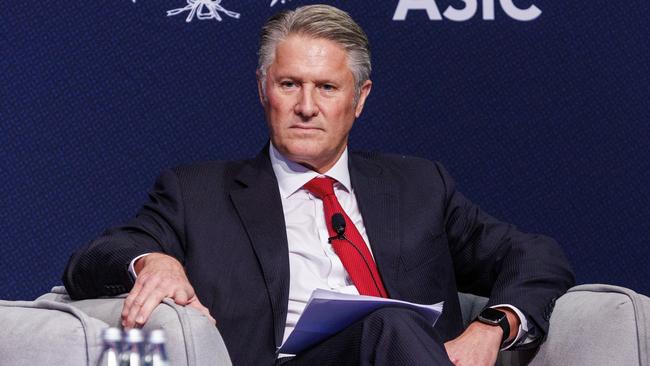Trade tensions worry Australia’s company directors, the findings of an AICD survey show
Company directors around Australia have a ‘heightened level of anxiety’ over the US Trump administration’s imposition of tariffs and its repercussions, a survey has found.

Business
Don't miss out on the headlines from Business. Followed categories will be added to My News.
Australian company directors have a “heightened level of anxiety” over the Trump tariff situation, worried that rising trade tensions threaten the economic outlook for Australia and the world, according to Australian Institute of Company Directors CEO Mark Rigotti.
“Director sentiment is ranging from caution and ‘let’s sit on our hands’ to worries about supply chains and the impact on consumer confidence,” he said in an interview with The Australian.
“At the big end of town, directors who have America as a market or part of their business operations are talking about relocating their operations.
“In other businesses which have no direct connection to America, there is even more uncertainty as they are worried about the impact on supply chains.”
Mr Rigotti said directors who previously had felt they might have been immune from the US situation now realise they are probably not. “That is where anxiety is at its highest, as no one is really sure what it’s going to look like,” he said.
He said directors at small to medium-sized companies were now worried about how the global uncertainty would affect consumer sentiment in Australia. “Conventional wisdom has it that consumers will stop spending when things get complicated and uncertain,” he said.
Mr Rigotti was speaking on the release of the AICD’s latest survey of director sentiment.
The survey, undertaken before last week’s wide sweeping Trump tariff announcements, showed that directors were becoming increasingly concerned about the global situation.
“Global uncertainty is now the top economic challenge facing Australian businesses, surpassing productivity growth and cost of living,” the survey says. “Concerns over global protectionism have increased significantly.”
The survey found that 88 per cent were concerned at the evolving policies of the Trump administration, with 90 per cent worried that escalating trade tensions between major economies were likely to threaten the global economic outlook. Just over 70 per cent were also worried that the impact of US environmental policies would cause challenges for Australia in meeting its sustainability goals.
The survey found a slight increase in director sentiment in the first half of 2025, showing an improvement in confidence about the outlook in Australia following the Reserve Bank’s rate cut in February, although the sentiment was still in negative territory.
But Mr Rigotti said he expected the outlook to now be more negative as directors across the board in Australia realised they would be affected in some way by the fallout from the Trump tariffs and the global trade uncertainty. He said the survey showed that directors were concerned about the burden of increasing levels of regulation, with concerns about skill shortages and cyber security that were top of the list a year to 18 months ago now slightly less pressing.
He said economic management was the most important issue affecting directors’ vote in the upcoming federal election, followed by the need to reduce red tape.
The AICD is calling on both political parties to pause new regulation and outline which “red tape” policies they would repeal in the first 100 days of their government.
Mr Rigotti said Australia was now out of step with trends in the UK, the US and Canada, where governments were actively moving to reduce regulation on business. “There is a deregulation movement sweeping the globe,” he said. “In the UK the government has effectively committed to a 25 per cent cut in the cost of doing business. You’ve got it coming out of the US, you’ve got it coming out of the UK, you’ve got it coming out of Canada.”
He said small and medium-sized businesses were the powerhouse of employment in Australia and were being choked by regulation. Australia needed to have a “mindset shift” to pausing new regulation, including having a cabinet minister in charge of improving regulation on business.
“We need someone who is tasked to come up with a better way of doing things and also stopping some things which are in the pipeline,” he said.
Mr Rigotti said the current environment was seeing “lazy regulation” by different departments and ministers that was resulting in overlapping regulations.
The survey found that 59 per cent of directors say regulation is the main factor affecting their boards’ risk appetite, with 67 per cent concerned that the next 12 months would see an increased regulatory burden. Industrial relations and planning regulations were seen as the most pressing areas for deregulation.
Originally published as Trade tensions worry Australia’s company directors, the findings of an AICD survey show



